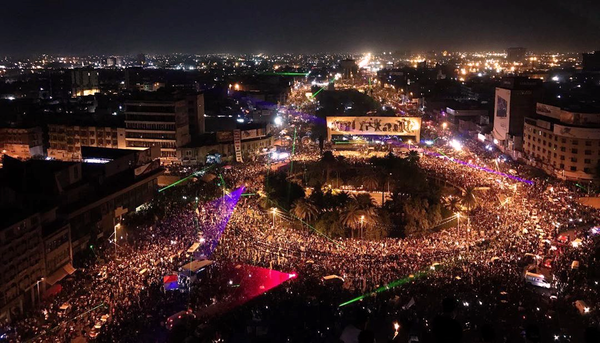Selbstorganisation auf dem Tahrir Platz in Bagdad
Aus Bagdad berichten Ansar Jasim und Schluwa Sama für OpenDemocracy über die Selbsorganisation auf dem Tahrir Platz.

(Tahrir Platz im Oktober; Quelle: Wikipedia)
Ob Müllabfuhr, Sicherheit oder Kinderprogramm, alles wird von Aktivisten in die Hände genommen, ganz so wie schon 2011, zu Hochzeiten des sog. arabischen Frühlings in so vielen anderen arabischen Ländern auch:
Self-organization is crucial. Protestors have organized traffic on the streets: There are two streets for Tuktuk drivers and a pedestrian street. At the liberation square itself, dozens of tents are visible, where people from different neighborhoods, leftist activists, delegations from various cities and regions, unions of teachers, doctors and lawyers all have space for self-organizing. Political parties are not visible. In the tents, there is medical equipment, helmets, and water. Here, people cook together, discussing and spreading the news from the local radio station. In the tents behind the park of the monument, there are very different exhibitions. An exhibition by a comic artist is next to an exhibition of a mosque although there is almost no presence of religious institution on Tahrir square.
Und auch sie betonen, was so vielen anderen Beobachtern auffällt: Dass es diesmal ganz bewusst um einen Protest geht, der konfessionelle und ethnische Spaltungen zu überwinden versucht:
At the entrance of the square Tuktuks greet people with the Arabic slogan “Irhal” and the Kurdish slogan “Bro”, meaning ‘Out’. These slogans in both languages are all over the place. A Kurdish-Arabic tent invites protestors for some free tea. Again, and again protestors recount the major solidarity of the Yezidi community, who sends money, but also brings food and water to the square. Even if they have no direct, visible presence on the square, they express their support for change that could lead to a new Iraqi identity.
“This is a movement of us all, your origin does not play a role here, we are all oppressed by one political class”, an activist explains. Posters banning any sectarian language in the name of the people are everywhere. Instead people are building references to uniting elements in history or in religious circles, the juxtaposition of Christian and Muslim symbols.